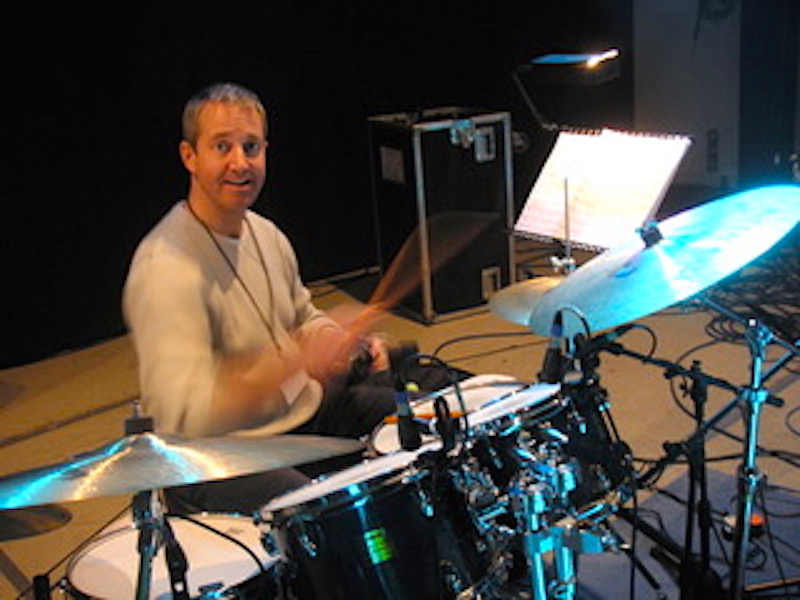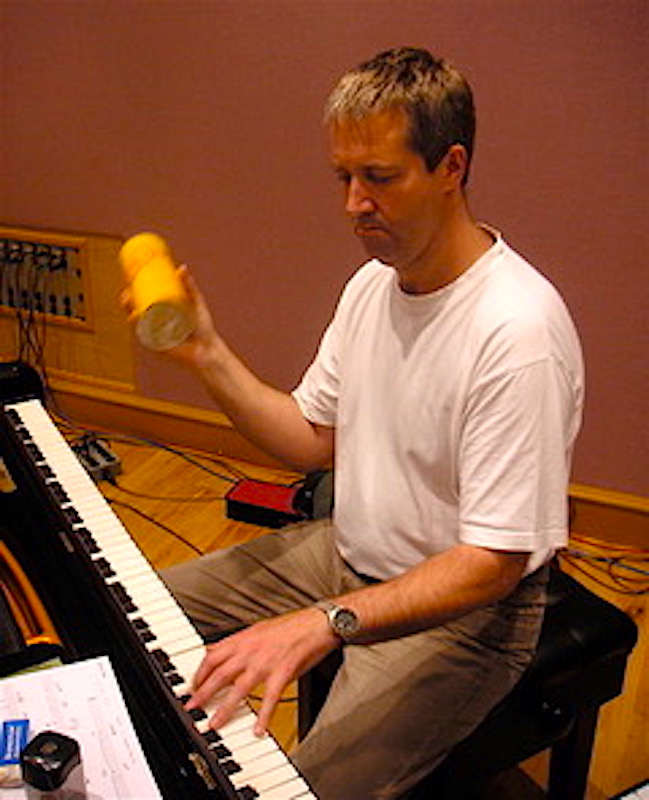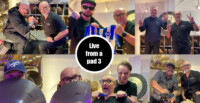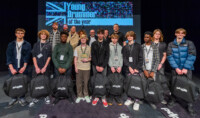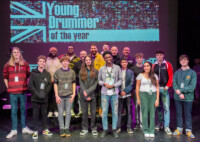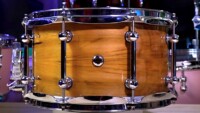There are dozens of musicals in London’s West End but few of them manage to make as much of an impact on the scene as The Lion King.
Being the worlds highest-grossing musical of all time, the show has been running in London’s Lyceum Theatre for over 20 years today; and there is no end in sight.
In the pit from the very beginning:
Dave Adams
Lion King (Keys 1 and now drums) – Mamma Mia (Original drummer) – Rent (M.D.) – Smokey Joe’s Café (M.D.) – We Will Rock You (Help set up original production) – Billy Elliot (Original drummer) – Hot Shoe Shuffle (piano MD and occasional drummer)
Born to a semi pro drummer father, Dave Adams picked up the sticks himself at only 2 years of age and already started performing around the Bedfordshire clubs at 5. “I just thought everyone played drums”, he remembers.
With a keen interest in music generally, Adams started studying classical piano which revealed his perfect pitch hearing – a skill that came in very handy throughout his whole career – and he later picked up the trombone.
Being offered a space at Chethams School of Music in Manchester, a specialist school for musically gifted children, Dave relocated to Cheshire with his parents and brother. “Going there was great because it put me in my place. Bedford was a little pond, this school was full of little geniuses and it makes you up your game”.
Manchester became a home for many years but as Adams was touring the world with various jazz artists, namely Andy Sheppard, George Russel, Mike Gibbs etc, he received more and more calls for work in London and eventually decided to move down to the city.
Since then Dave has been a part of London’s West End being a rehearsal/ audition pianist, musical director, piano/keyboards and drummer/percussionist in various shows for over 30 plus years.
Having spent most of his spare time over the years depping on different West End shows or touring the world with various artists, Dave has now cut back and enjoys his time off by composing music for jingles, spending quality time with his wife, children and grandchildren and as even managed to start teaching himself another instrument, the guitar, which he made a promise to himself to commit to on his 60th birthday a couple of years back.
How did you start getting work in the West End?
I got into touring shows first. I was in Manchester when a drummer friend of mine who was playing on a show called me up. He was working with the singer Lulu that day and couldn’t be at the theatre in time for the curtain up, so he asked me if I could go in and sight-read/cover the show until he got there. The fixer happened to be in that night and must have liked what I did and booked me again a few days later for another touring show and that, as they say, was that! It was nothing planned, I was just in the right place at the right time.
The next thing I knew it all took off and I was offered all kinds of theatre tours. That was great but I was doing a lot of jazz tours at the time which I really loved and was my true calling. Theatre shows were paying good money though, and it was regular. It was hard but I somehow managed to tour in Europe and keep a show going here at the same time.
The first thing I really got in the West End was being asked to MD Smokey Joe’s Cafe on piano. That was a brilliant show, all gospel, R&B, with a hell of a piano part and we were on stage for that which was great, and I also had my own song to perform at the top of Act 2!!
That led to me being the MD on Rent at The Shaftesbury Theatre then suddenly I was being asked to MD a lot more around London. This was all well and good, but there were so many meetings to attend with management and ‘the creative teams’, which mostly had nothing to do with the music side most of the time, and they didn’t really need me there, and that wasn’t for me. I was basically living at the theatre and I was bored of that. I am a musician after all and just wanted to perform and play music. Anyway, around that time my son was born and I didn’t want to miss him growing up, so I left the MD world and became a depping muso so I could be at home more.
Luckily the musical supervisor of Lion King came to help me out on Rent towards the end of my tenure on that show and offered me the Keyboard 1 chair at Lion King. Nobody knew this Lion King show at all in the UK then, so it was quite a gamble but here we are over 20 plus years later.
During a period after I left Lion King as the keyboard player, I was occasionally depping for other West End drummers on shows, so when Andy Newmark and Guy Richman left Lion King after 5 years on the drum chair there, they asked me to take over. Happy days – I took it! A regular chair again and I could sleep in my own bed every night
What are the main challenges of playing in musical theatre?
Conductors mainly [laughs] and being able to read well and play ALL styles convincingly!
What was the hardest show you’ve ever played – and why?
It’s a bit hard to say because I’ve played different shows on different instruments. On piano it’s definitely Smokey Joe’s and its BIG gospel piano styling!!. On drums I would say probably The Lion King because it’s so diverse and it’s quite a heavy play as well. You have to play hard in some sections, so I change drum heads quite regularly, especially tom heads. It’s main challenge though is the diversity of musical styles in the show.
We start with Circle of Life which is quite a funky number and that’s great because it sets you up nicely but again you have to play it quite heavily. I’m not talking John Bonham but it’s hard enough that you have to be careful at my age. [laughs] So I always do half an hour warm up before I play. I’ve been like that on all my instruments. Warming up is SO important especially if you want your hands to last you a lifetime of playing!
I always go and meet the lads for a coffee and a sandwich before the show but then with 30 minutes to go I head down to my drum booth and warm up on the practise pad.
What’s your advice for players who want to prepare themselves for working in musical theatre?
Work with as many conductors and different musical styles as you can. And get your reading really up to scratch because some charts are a nightmare. I wish they would just get in a room and decide on a way of writing drum parts. It is a lot more standardised now. Piano music is written properly; so is violin music. Drum music, especially years ago, was awful. You really had to do it yourself and then they would say it’s not right. “Well, I can play what you’ve written if you want a real laugh”.
It is a lot better now though. I mean, the original Lion King drum parts were a tad dodgy. They once said to us: “The Americans are coming in to see the show tonight, can you play what’s written in the part”. We did and it sounded awful so the MD shouted at us “No. No. Go back to what you were doing!”. It’s a great part but the way it’s written in sections is really weird and not exactly correct. They probably just recorded the original drummer and had someone write it out. These things always go through various ‘filters’ but yeah, read as much different music as you can and work with as many different muso’s and MD’s as you can – good and bad. Because that’s the real world and if you can handle the bad ones, the good ones are a dream.
How important is it to have a solid knowledge beyond ‘just’ the drum set? For example percussion, tuned percussion or electronics.
Very. Very important. I always recommend musicians to learn other instruments as well – especially drummers and by that I mean like the pianoforte. Every instrumentalist should have a decent level of piano technique and knowledge in their arsenal, it’s the centre of music I believe. You can do everything on the piano!! Groove, arrange, accompany, solo, orchestrate etc etc!! The whole rhythm section I believe should learn each others instruments to some degree. As a drummer learning piano has helped me so much.
Playing another instrument means you’re aware of what their physicality is and what they have to go through. Playing trombone for example helped me a lot playing with wind players because I’m breathing with them. Building up your arsenal can only help. Learn as much as you can, it’s a big and even more diverse world of music out there now!!
A lot of drummers won’t be used to working with a conductor. What are the challenges there?
Oh… where do you want me to start? Some of them don’t have a drummers sense of time. (Don’t get me wrong, some do!!) That’s fine if you play orchestral stuff – yes, music should breath – but if you have a groove number… oh boy…I have some stories I could recall.
It’s all about reading facial expressions and body language. If you watch them closely you can tell if they need your help or not. Some of them have that false ‘follow me on that’-look on their face and you just think: yeah I could but it means we’re all going over the cliff together.
I’ve actually ended up in a few conversations with MDs. For example I did some stuff with The Grand Union Orchestra a few years back, whose leader and composer, Tony Haynes, had written all the original music for a concert we were performing at the Hackney Empire but this time to be accompanied by the BBC concert orchestra, again all orchestral arrangements written by Tony.
So before we started to play at the first rehearsal I thought I’d go have a chat with the conductor – a very nice guy from Vienna who was brought in at the very last minute to lead the proceedings. I basically just said: “Just to let you know: I’ve played these charts with this orchestra lots of times, so in case you’re ever stuck on any tempos, we’ll be alright”. I wasn’t arrogant about it but I was just letting him know that I’m there for him and that he can relax and look after the rubato stuff. You do it in a nice way of course and you really have to weigh up their personalities. It’s all about being a good mind reader and interpreting the situation. The more you do it, the better you’ll get at it. So again, work with as many MDs as you can.
On Lion King we have about four or five MDs that share the chair and we’re very lucky that we don’t have any bad ones. All the dep MDs are usually trained by the main MD (which can go either way) but there are still differences between them all as there are drummers who dep for me….we’re all human! Sometimes though it can be wildly different actually. They think they’re being as clear as day but they’re not. Something I did when I was an MD, was to rehearse certain things in front of the mirror at home to see if I’m actually being as clear as I think I am. It can be a real eye opener sometimes.
Again, one thing that actually really helped me when working with more classical conductors is the fact that I play trombone. When he gives me the down beat I just know not to just go ‘bang’ but to breath first, like a brass player would. That really helps.
You play eight shows a week. How do you keep it fresh and interesting for yourself?
It can be hard but although we’re playing the same show every night, there are actually quite a few variables that change all the time: different musicians, different cast members, different conductors and so on.
Also, our band gets on really well which you can’t say that about every show that runs a long time. In some shows I’ve known people not talking to each other for months, years!!
We constantly talk in the show at the Lion King but not to the detriment of the music I hasten to add!! There is always something going on and there are lots of smiling faces in the pit. It’s been running over 20 years now and people are still happy. That’s gotta say something.
I think it stems from the fact that we look after the show. We’re not going in there taking the piss. We want it to be good and we care about our chairs. For years we didn’t have a fixer so you booked your own deps. That made you care about it more because it was all on your head – rather than just calling the fixer and forget about it. That vibe has carried on. Even though we now have a fixer, we still care.
Out rhythm section is full of incredible players, they’ve all earned their dues after years in the industry and they all still turn up and care, same with their deputies. I think that when you get to that sort of standard that we’re at, you have a level that you don’t want to drop below. You just can’t allow yourself to do it even if you’re feeling tired – and there have been lots of those moments. If I’m tired or feeling a bit low I keep telling myself that this is the first time this audience is seeing the show. I’ve actually got a little sticker in my drum booth at the show, which says: “This is their first time (the audience) remember that.”
People always say “you’ve been playing the same notes every night for so many years” – but it really is a different show every night and the band is just so good. I absolutely love it and count my lucky stars!!
 How does being on stage compare to being in a pit?
How does being on stage compare to being in a pit?
I love being on stage. On Rent, Smokey Joe’s Cafe and the Rod Stewart Musical, Hot Shoe Shuffle, we were all on stage and it makes a lot of difference. If you’re shut off for too much you can start thinking ‘I’m just playing to these four walls’. You just have to remind yourself of what I said before: It’s some paying audience members first time seeing the show. Remember that!
We were lucky that in Mama Mia and now in Lion King we can actually see the audience because the pits are quite open. I can see nearly all 2200 audience members from my chair. That’s actually an amazing thing about Lion King: we do 104% audience capacity at a lot of the shows. That means some people are standing. It’s crazy! The show will probably outlive me.
How has technology changed working in the West End?
Not too much in our case actually.
I actually used an electronic drum kit on quite a few numbers but now we’re keeping it all on the acoustic kit with a few Octapad triggers for the odd sounds. The electric drum kit just wore out and because the show started in 1997 ish, the sounds were really out of date. It kind of started to sound a bit Mickey Mouse, excuse the pun, so we just moved it onto the acoustic kit and left the rest to the mixing desk.
We also have three percussionist who all do loads of stuff – and none of them use any electronic stuff but the sound can doctor it if need be. I heard it out the front once and couldn’t believe the sounds they were getting out of it all. It’s great that they do it that way around.
I think part of it is also that the show has its roots in Africa. That helps keep it all on acoustic instruments.
There are other shows though that use tons of electronics – Hamilton for example. The age of the show would explain that as well though I guess especially with the technology around now!!
So yes, I guess apart from the computers for the sound system and maybe the keyboards, not much has changed for us percussionists in the show though. As I said though, that’s just down to the nature and roots of the show.
Thanks a lot for your time Dave!
Interview by Tobias Miorin
February 2020



